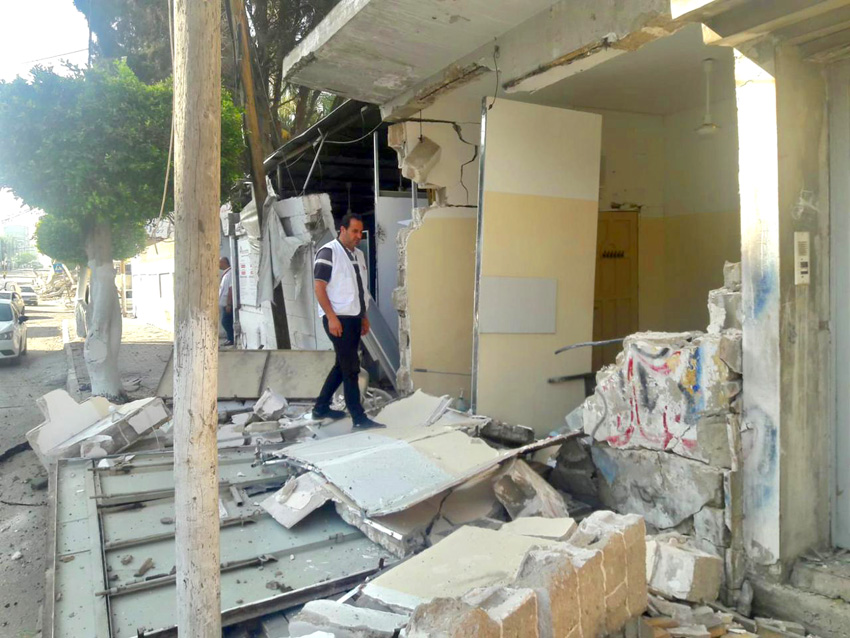
THE PALESTINIAN resistance will finally succeed in lifting Israel’s years-long siege on the impoverished Gaza Strip and commence its reconstruction, the resistance movement Hamas says.
In a press statement, carried by the Palestinian Information Centre, Hamas Political Bureau member Mousa Abu Marzouk said on Sunday that all options are on the table to deal with the Israeli behaviour.
‘We will not accept any Israeli delays or any attempts to link the prisoners swap deal with the reconstruction file,’ the Hamas official added.
Gaza, home to some two million Palestinians, has been under Israeli siege since June 2007. The tight blockade has caused a decline in the standards of living as well as unprecedented levels of unemployment and unrelenting poverty.
Abu Marzouk further stressed that the Gaza-based Hamas is working to relieve Gaza citizens’ suffering, saying that the Palestinian Authority (PA), which is based in the occupied West Bank, does not want any solution for the blockaded enclave except after removing Hamas from the scene.
The Ramallah-based PA, which is run by the ruling Fatah party and led by President Mahmoud Abbas, considers Hamas as its arch-rival.
‘Fatah movement deals with the institutions of the Palestinian people as a private property,’ the Hamas official went on to say, accusing Fatah of being one of the most important causes of Palestinian crises.
He said the establishment of the Executive Committee of the Palestine Liberation Organisation (PLO) is supposed to be according to a transparent and fair mechanism, and ‘not according to the Fatah movement.’
Abu Marzouk further emphasised that there is a necessity to reshape the leadership of the Palestinian people according to democratic and national foundations, to strengthen partnership in decision-making, to end current monochromic attitude, and to rebuild the PLO so that it encompasses all components of the Palestinian people.
Elsewhere in his remarks, he also hailed efforts by Russia to end the Palestinian division, stressing that Hamas has no conditions on national dialogues, and has never set conditions for commencing new rounds of dialogue.
Abu Marzouk noted that Hamas had welcomed the Russian invitation, but that ‘officials in the Fatah movement did not inform the Russians of their response.’
The Palestinian leadership has been divided between Fatah and Hamas since 2006, when the latter scored a landslide victory in parliamentary elections in the Gaza Strip. Hamas has ever since been running the coastal enclave, while Fatah has been based in the autonomous parts of the Israeli-occupied West Bank.
Previous reconciliation attempts by the two sides to form a power-sharing unity government in Gaza and the West Bank have failed.
In the latest Israeli bombardment campaign against the Gaza Strip, at least 260 Palestinians, including over 60 children, were killed in a time span of 11 days that began on May 10 last year.
That came following Palestinian retaliation for violent Israeli raids on worshippers at al-Aqsa Mosque and the regime’s plans to force a number of Palestinian families out of their homes at the Sheikh Jarrah neighbourhood of East al-Quds (East Jerusalem).
In response, Palestinian resistance movements, chief among them Hamas, launched Operation al-Quds Sword and fired more than 4,000 rockets and missiles into the occupied territories, killing 12 Israelis.
Apparently caught off guard by the unprecedented barrage of rockets from Gaza, Israel announced a unilateral ceasefire on May 21, which Palestinian resistance movements accepted with Egyptian mediation.
- The Palestinian resistance movement Hamas says Israel’s medical negligence is behind a surge of Covid-19 among Palestinian prisoners in Israeli jails.
Dozens of Palestinian inmates in two Israeli prisons, namely Ofer and Eshel, have tested positive for the contagious disease, the Palestinian Information Centre, citing human rights sources, reported on Sunday.
According to the Palestinian Prisoners Club, some 100 inmates contracted the coronavirus in Ofer (sections 17 and 22) while ten others tested positive in the Eshel prison, including Nael al-Barghouthi, who has entered his 42nd year in Israeli jails.
Figures by the Palestinian Information Centre on Monday showed that, with new patients, 526 Palestinian prisoners have contracted Covid-19 in Israeli jails since the beginning of the pandemic.
Hamas blamed the Israeli regime for the spread of coronavirus among Palestinian inmates in Israeli jails, saying the new surge was the result of deliberate medical negligence.
Hamas spokesman Hazem Qassem said in a statement on Sunday night that the spread of the disease among the prisoners revealed the absence of any preventive measures or primary care for those prisoners.
The Hamas official held the Tel Aviv regime fully responsible for the lives of Palestinian inmates, urging the Red Cross and human rights groups to provide whatever is necessary to protect those prisoners and prevent further spread of the disease among them.
More than 7,000 Palestinian prisoners are currently held in some 17 Israeli jails, with dozens of them serving multiple life sentences.
Over 540 detainees, including women and minors, are under Israel’s administrative detention, in which Israel keeps the detainees without charge for up to six months, a period which can be extended an infinite number of times.
- The Israeli occupation authorities (IOA) ordered the demolition of four Palestinian under-construction houses in the town of Rujeib, east of Nablus, on Monday.
Local sources reported that Israeli occupation forces (IOF) stormed the town accompanied by Civil Administration crews and handed four citizens orders to stop the construction of their houses for allegedly being built in Israeli-controlled Area C.
Rujeib is a Palestinian town in the Nablus Governorate in northern West Bank, located three kilometres southeast of Nablus.
According to the Palestinian Central Bureau of Statistics (PCBS), the town had a population of 3,915 inhabitants in mid-2006.
After the 1995 Oslo accord, 28% of Rujeib’s lands were classified as Area B, the remaining 72% as Area C. Israel has confiscated 169 dunums of land from Rujeib for construction of the Israeli settlement of Itamar.
The village is routinely subjected to systematic settler attacks aimed to expel its residents in favour of Itamar settlement expansion plan.